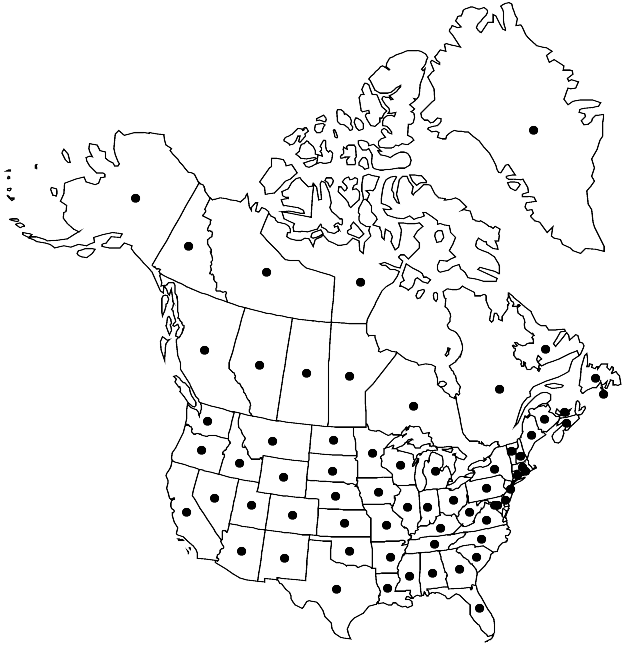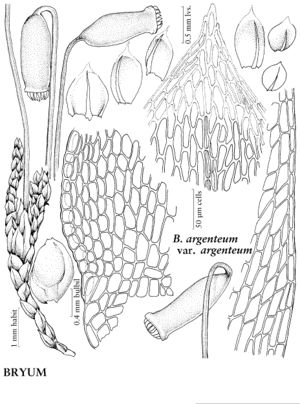Difference between revisions of "Bryum argenteum"
Sp. Musc. Frond., 181. 1801.
FNA>Volume Importer |
imported>Volume Importer |
||
| (5 intermediate revisions by 2 users not shown) | |||
| Line 9: | Line 9: | ||
|special_status={{Treatment/ID/Special_status | |special_status={{Treatment/ID/Special_status | ||
|code=F | |code=F | ||
| − | |label= | + | |label=Illustrated |
}} | }} | ||
|basionyms= | |basionyms= | ||
| Line 56: | Line 56: | ||
-->{{#Taxon: | -->{{#Taxon: | ||
name=Bryum argenteum | name=Bryum argenteum | ||
| − | |||
|authority=Hedwig | |authority=Hedwig | ||
|rank=species | |rank=species | ||
| Line 67: | Line 66: | ||
|publication title=Sp. Musc. Frond., | |publication title=Sp. Musc. Frond., | ||
|publication year=1801 | |publication year=1801 | ||
| − | |special status= | + | |special status=Illustrated |
| − | |source xml=https:// | + | |source xml=https://bitbucket.org/aafc-mbb/fna-data-curation/src/2e0870ddd59836b60bcf96646a41e87ea5a5943a/coarse_grained_fna_xml/V28/V28_192.xml |
|genus=Bryum | |genus=Bryum | ||
|species=Bryum argenteum | |species=Bryum argenteum | ||
Latest revision as of 21:34, 5 November 2020
Plants gregarious or in dense mats, white-green to silver-green. Stems 0.2–1 cm, strongly rounded julaceous or sometimes gemmiform. Leaves erect when moist, ovate to ovate-lanceolate, somewhat concave, 0.3–1(–1.2) mm; base green; margins rarely recurved proximally or plane distally; apex broadly rounded to acute, not cucullate, hyaline in distal 1/4–1/2 of leaf or rarely nearly entirely green; costa not reaching apex, apiculus present, sometimes short or nearly absent, hyaline, irregularly incurved when dry; proximal laminal cells quadrate or short-rectangular, 12–18 µm wide, 1–2:1; distal cells short- or elongate-hexagonal, (30–)40–80 × 10–15 µm, (1–)3–5:1, walls thin or somewhat thickened, not distinctly incrassate. Specialized asexual reproduction by leaf axil bulbils, leafy, small. Seta brown to red-brown, 1–2 cm. Capsule red to red-brown, ovate, 2–3 mm; hypophysis differentiated, somewhat thickened. Spores 8–15 µm.
Distribution

Nearly worldwide.
Discussion
Varieties ca. 30 (3 in the flora).
Bryum argenteum is perhaps the most widespread and distinctive moss in the world, although in many regions it is found primarily in urban or other heavily disturbed sites and is mostly absent from native undisturbed habitats in the tropics. There are about 15 silver-white species described, with species definitions based on a combination of one of three or four different basic gametophyte morphologies combined with subtle differences in the sporophytes. However, much of the gametophyte variability in the complex is also exhibited by B. argenteum itself, thus confusing species-level identifications. This complex is urgently in need of worldwide molecular and morphological studies.
Selected References
None.
Key
| 1 | Stems loosely julaceous; plants green; leaves hyaline near apex; costal apiculus long. | Bryum argenteum var. majus |
| 1 | Stems distinctly julaceous or gemmiform to short-julaceous; plants hoary white to silver-green; leaves hyaline in distal 1/4 -1/2; costal apiculus absent, short, or long | > 2 |
| 2 | Stems 0.5-1 cm, julaceous; leaves longer than broad; distal laminal cells elongate, 3-4(-5):1; costal apiculus long. | Bryum argenteum var. argenteum |
| 2 | Stems shorter than 0.2 cm, sometimes gemmiform; leaves often broader than long; distal laminal cells short, (1-)2-3:1; costal apiculus absent or very short. | Bryum argenteum var. muticum |
